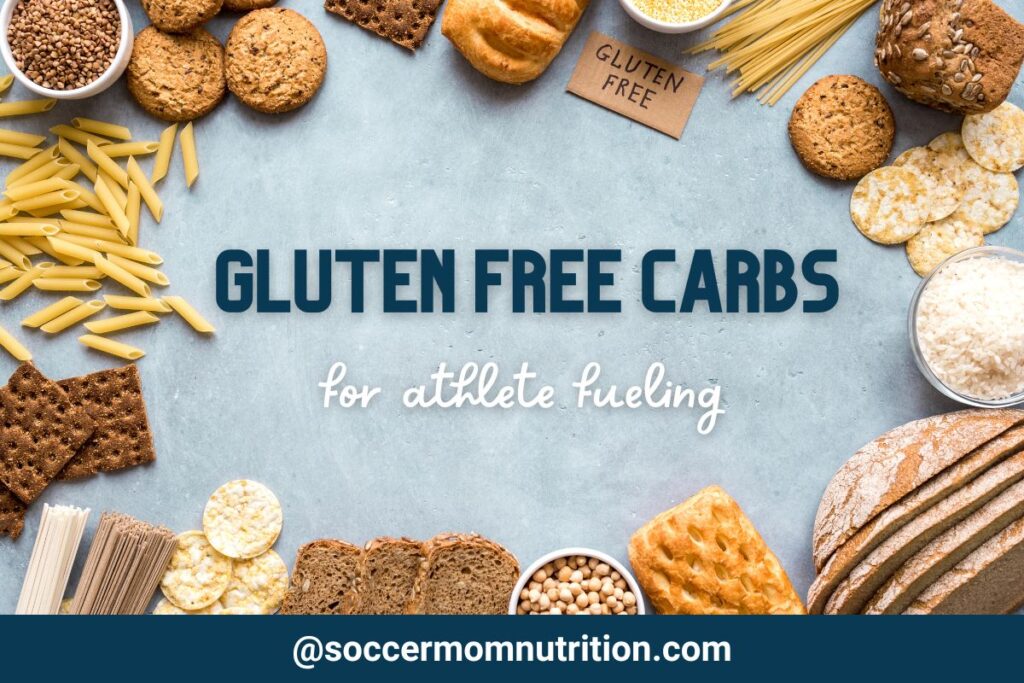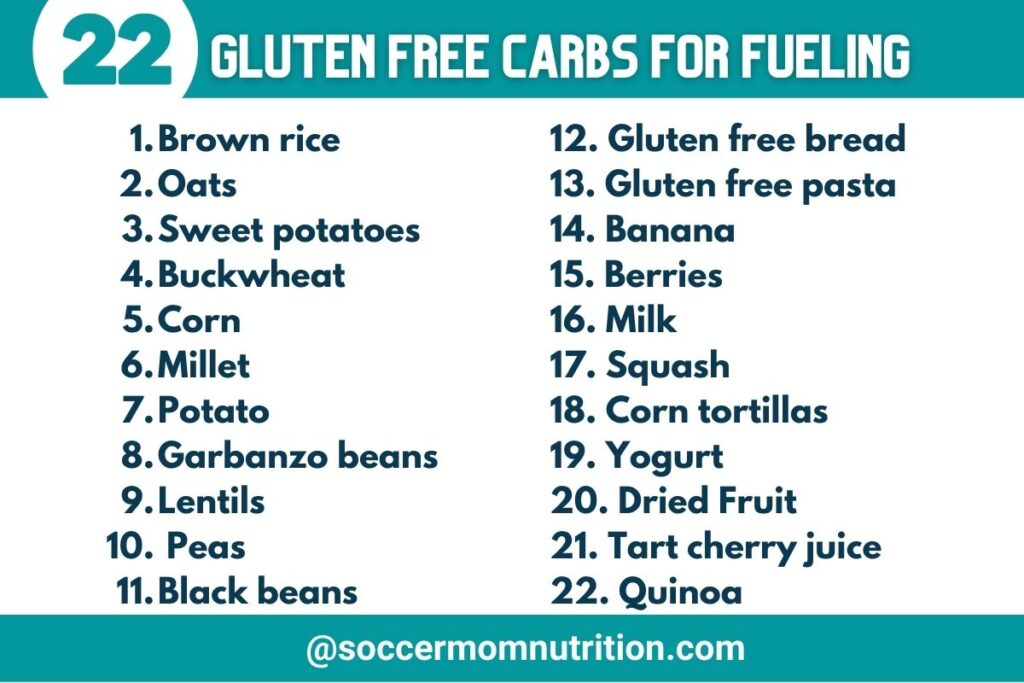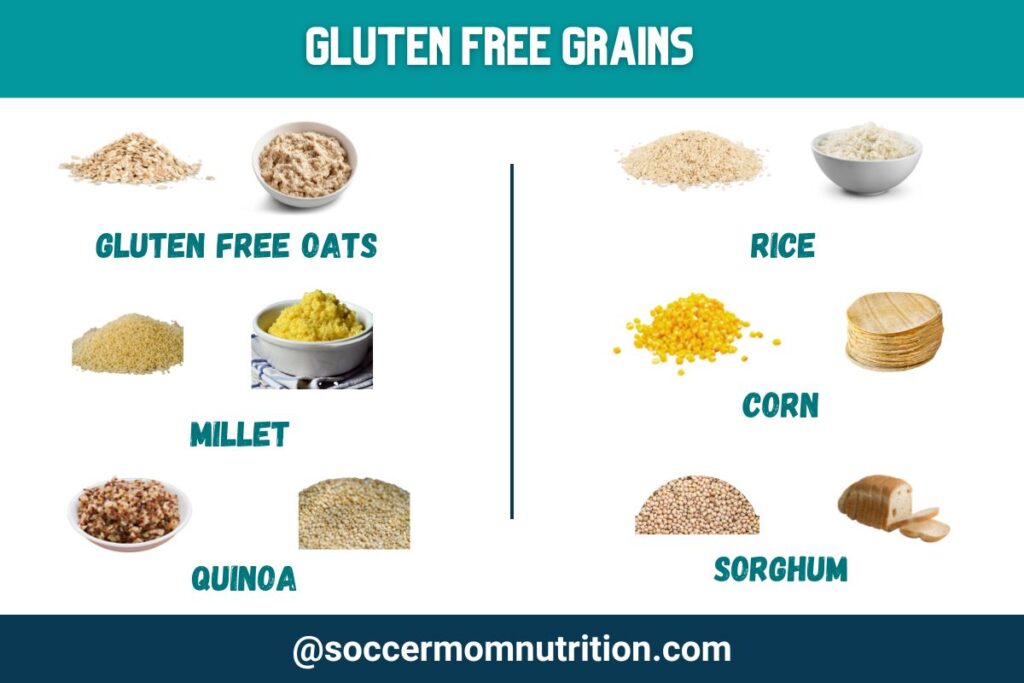Gluten Free Carbs: Ultimate Guide to Gluten Free Fueling
Are you looking for the best gluten free carbs to fuel optimal performance?
Finding gluten free carbohydrates sources can be challenging, especially if you have celiac disease, gluten sensitivity or wheat allergy. That’s why we’ve compiled a list of the best gluten free carb options for athletes.
Gluten free carbs are not only great for providing energy, but they also offer many health benefits. They are rich in fiber, vitamins, minerals and antioxidants to support your overall health and well being.
Plus, fiber rich carbohydrates help you feel fuller longer and prevent blood sugar spikes and crashes, so that you can have long lasting energy on the field.
In this article, you’ll discover some of the best gluten free carbs for athletes.
And we’ll teach you how to incorporate them into your diet and how much you should eat depending on your goals and activity level.
So keep reading and get ready to fuel your body with gluten free goodness!

What are carbohydrates
Carbohydrates or carbs are one of our six essential nutrients. Since your brain and muscles rely on them as an important sources of energy, especially if you are an active athlete.
Additionally carbohydrates have an important role in digestion by improving the microbiome, aiding digestion and helping to keep bowel movements regular. (1)
Since many sports nutrition recommendations for athletes are based on gluten containing carbohydrates such as crackers, bread, pretzels and pancakes, you may feel like you don’t have many options.
However gluten free carbs are found naturally in many types of foods from grains, starches, fruits, veggies and simple sugars.
Additionally, many companies have created gluten free products that taste as good or better than than their gluten containing equivalent.
What is gluten
Gluten is a protein found in grains like wheat, barley and rye. Products made from these grains, such as bread, pasta, cereals and baked goods, contain gluten.
Sometimes processed foods like sauces, gravies and salad dressings have gluten as a thickener or stabilizer. So, you’ll want to read food labels to make sure you make a gluten free choice.
Any food that is by nature gluten free does not have to be labeled as gluten free.
FDA regulation defines “gluten-free” but does not require a gluten free food to be labeled as gluten free.
You may see a certified gluten free symbol letting you know that it’s a certified gluten free product. If you’ve got celiac disease, this symbol let’s you know that the product should be safe to eat.
Which carbohydrates are gluten free
Gluten free carbs can be found naturally in many types of foods from grains, starches, fruits, vegetables and simple sugars.

All of these foods break down into sugar (glucose), the primary source of fuel for your muscles during practice, games and competitions. Additionally, your body stores sugar in the muscles and liver as glycogen.
Generally, the best gluten free carbs for athletes are:
- Gluten free grains and seeds
- Starchy vegetables
- Legumes and beans
- Fruits, fresh and dried
- Milk and yogurt
- Gluten free breads and pastas
Check out our gluten free carbs list below, broken down by category.
Gluten free grains and seeds
- Quinoa: This superfood is a great source of carbohydrates, protein, fiber, and essential nutrients like iron and magnesium. You can eat quinoa in sweet or savory meals from breakfast with fruit and nuts to a savory quinoa salad.
- Brown rice: Brown rice is a nutrient-rich, high fiber gluten free carb source. It makes a solid pre game meal when paired with your favorite veggie and lean protein for a rice bowl.
- Buckwheat: Despite its name, buckwheat is actually gluten-free and a great source of protein and fiber. You can use buckwheat flour in place of flours for pancakes, waffles and other baked goods.
- Corn: Corn is a versatile carb source used in many dishes, from polenta to tortillas. Combined with a starchy legume like black beans, you can make a quesadilla or taco for a hearty snack.
- Oats: Although oats are naturally gluten free, they can be contaminated during processing. Look for certified gluten free oats to be safe. Oats make a great breakfast, pre- and post- game snack or even a late evening snack for a carb boost.
- Millet: This gluten-free grain is a good source of fiber, protein and minerals. Use millet in place of or combine with brown rice for a hearty, nutritious buddha bowl.
- Amaranth: This ancient grain is high in protein and fiber and has a slightly nutty flavor. It makes a great hot cereal for an early morning breakfast.

Starchy vegetables
Starchy vegetables are a good source of naturally gluten free carbohydrates. Generally a 1/2 cup serving of legumes provides 15 grams of gluten free carbohydrates.
Here are some examples of gluten-free starchy vegetables:
- Potatoes: Potatoes are a versatile vegetable that can be cooked different ways. They are a good source of carbohydrates, potassium, and vitamin C. Potatoes can be an excellent quick carb to eat closer to game time. One medium-sized potato contains around 30 grams of carbohydrates.
- Sweet potatoes: Sweet potatoes are a nutrient-dense vegetable that are packed with fiber, vitamins, minerals and antioxidants. One medium-sized sweet potato contains around 27 grams of carbohydrates.
- Yams: Yams are similar to sweet potatoes and are a good source of carbohydrates, fiber, and vitamin C. One medium-sized yam contains around 37 grams of carbohydrates.
- Winter squash: Winter squash, such as butternut, acorn, and spaghetti squash, are nutrient-dense vegetables and good source of carbohydrates, fiber, and vitamin A. One cup of cubed butternut squash contains around 25 grams of carbohydrates.
- Corn: Corn is a good source of carbohydrates, fiber, and some important nutrients like vitamin C, thiamin, and folate. A 1/2 cup of corn provides about 15 g of carbs.
Legumes
Legumes are a good source of carbohydrates, around 20 grams per 1/2 cup serving. They also contain protein, fiber and many important nutrients like iron, folate and potassium. Peas in particular are a good source of vitamin C and vitamin K.
Try these different varieties in soups, burritos or wraps, blend to make a dip for veggies or roast and toss on salads:
- Chickpeas
- Black beans
- Lentils
- Peas
- Split peas
Fruits
Fruits provide an excellent source of naturally gluten free carbohydrate, essential vitamins, minerals, antioxidants and fiber.
Generally one 1/2 cup serving of fresh fruit provides about 15 grams of carbs. Larger pieces of whole fruits provide around 30 grams of carbs. Also, one 1/4 cup serving of dried fruit provides 15 grams of carbs.
Here are some suggestions:
- Berries: Berries, including strawberries, blueberries, raspberries, and blackberries, are a great source of antioxidants and fiber. Add them to a smoothie, top on your yogurt, cereal or oatmeal.
- Apples: Apples are high in fiber and vitamins, making them a great option for a quick and healthy snack.
- Bananas: Bananas make a good pre-, post and halftime snack since they are a good source of carbs, potassium, and vitamin C.
- Citrus fruits: Oranges, grapefruits, lemons, and limes are high in vitamin C and orange slices make a great half time snack.
- Pineapple: Pineapple is a tropical fruit that is high in vitamin C and bromelain, an enzyme that aids in digestion and recovery after exercise.
- Mango: Mango is a sweet and juicy fruit that is high in vitamin C and fiber.
- Grapes: Grapes are a good source of carbs and antioxidants, making them a great option for a halftime snack.
- Pears: Pears are a good source of fiber and vitamin C, and make a hearty snack when dipped in almond butter.
- Dried fruits: From dried blueberries, tart cherries, satsumas, pineapple, dates and more you’ll find a favorite that you can use as a snack, in a trail mix or top on your favorite yogurt.
- Tart cherry juice: Tart cherry juice provides an excellent source of carbohydrate. In addition, it has anti-inflammatory effects as well as aids in sleep. Add this to your smoothie or drink 8 oz post exercise.
Try blending fruits with your favorite low fat greek yogurt to make a smoothie for an easy high fiber breakfast or healthy snack. Top your favorite yogurt with berries and gluten free granola for a high fiber, anti inflammatory treat.
Milk and yogurt
Milk and yogurt are another good source of gluten free carbs.
Typically a 1 cup serving of milk has around 12 grams of carbs.
Yogurt provides around 8-12 grams of carbs per 8 ounce serving. However some yogurts have additional added sugars and sweeteners that increase the amount of carbs per serving.
Rather than selecting the high sugar options, you can add your own fresh or dried fruit to make it sweeter. Blend milk or yogurt with your favorite fruit or veggies for an easy high fiber smoothie.
Boost your smoothie’s protein content by adding high protein milk.
Also, chocolate milk makes a great recovery drink or after game snack since it contains carbohydrates from both milk sugar and added chocolate.
Gluten free carb packaged foods
Today you can find many gluten free carbohydrate packaged foods that have typically only been gluten-containing, on grocery store shelves.
From chickpea, lentil and brown rice pastas to granola bars, breads and tortillas, you’ll find gluten free carb source options to create a well rounded athlete pre game meal, snack and post game meal.
Final thoughts
Every athlete relies on carbs for energy to fuel your muscles. Even if you’re following a strict celiac disease diet, you have many options for gluten free carbs that will provide you more than enough energy to sustain your performance.
And when you’re traveling for tournaments, you’ll find gluten free carb options at restaurants like Chipotle, Noodles and Company and Cava.
Check out our post on performance nutrition for more information.
What are your favorite gluten free carbs?
Join our mailing list and get our FREE Pre-Activity Fueling Guide.
Stephanie Magill, MS, RD, CD, FAND has over 22 years of experience in public health and nutrition. As a performance registered dietitian nutritionist, Stephanie specializes in sports nutrition and provides simple and actionable information so that athletes can be well fueled for high performance on and off the field. Stephanie has a Master’s Degree in Nutrition and is a Fellow of the Academy of Nutrition and Dietetics.

